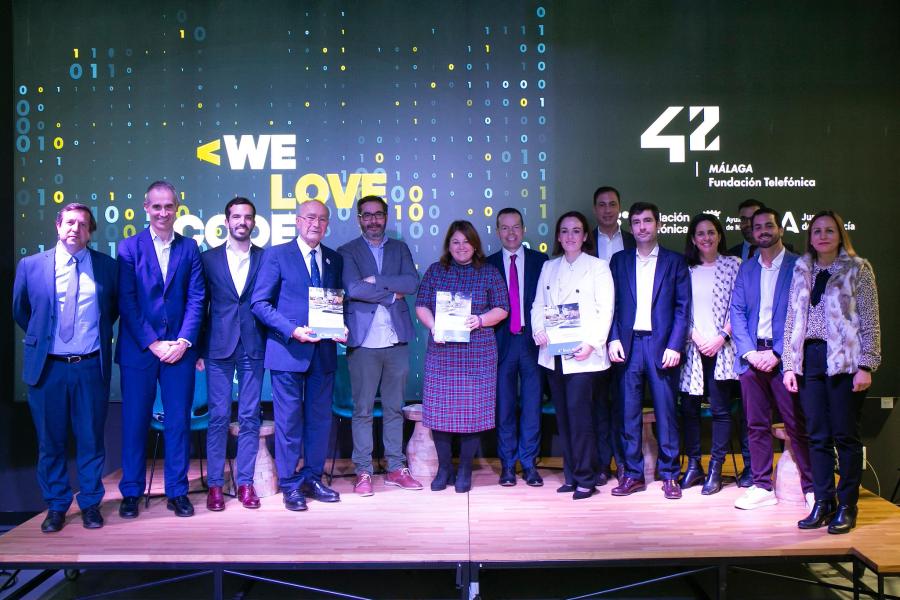
- The European Investment Bank (EIB) Advisory Services, in collaboration with the Cotec Foundation, has produced a study on the digitalisation of small and medium-sized enterprises (SMEs).
- The study identifies recurring barriers hindering the uptake of digital technologies by SMEs and presents relevant best practice and recommendations for future intervention at national level.
- The presentation was held today at an event in Málaga attended by Mayor Francisco de La Torre, representatives of the EIB and experts from the digital and business world.
The EIB and the Cotec Foundation for Innovation held an event today in Málaga to present a report on the digitalisation of Spanish SMEs produced by the European Investment Bank with funding from the European Investment Advisory Hub. The report was produced in collaboration with Cotec and with the consultancy support of Oliver Wyman. The study assesses the current status of SME digitalisation in the country, identifying recurring barriers to the uptake of digital technologies by Spanish SMEs, and providing best practice examples from around the world as well as recommendations to reduce the digital gap at national level.
The event was attended by the Mayor of Málaga Francisco de la Torre, the Managing Director of Cotec Jorge Barrero, the Head of the EIB Office in Madrid Fernando Torija, and the Head of Fundación Telefónica’s Campus 42 Inés Temes. Oliver Wyman’s Director of Public Sector and Financial Services Gonzalo Arana and Cotec’s Director of Economics Aleix Pons presented the report.
The event was held at Fundación Telefónica’s Campus 42 in Málaga, one of the most innovative programming schools in the world. Its goal is to provide training to cover the most in-demand digital profiles on the job market and to educate society in areas such as cybersecurity, artificial intelligence, big data, blockchain and cloud computing.
Main findings from the report
Small and medium enterprises play a pivotal role in the Spanish economy, representing over 70% of the workforce, 99% of enterprises and 61% of the value added. However, the adoption of digital technologies by Spanish companies is low or very low for 75% of them.
Despite the digitalisation of small and medium enterprises being high on the Spanish government’s agenda, there is on average a low demand for digitalisation from Spanish small and medium enterprises. 34% of such companies do not plan to invest in the next three years. Spanish companies are behind on the adoption of technologies: only 27% of them have e-commerce sales despite 75% of them having a website. This is mainly because these companies are often unaware of what tools can be used to digitalise their business and sometimes lack the necessary skills among their employees to use technology to its full potential.
While funding has not been the main problem of SME digitalisation in recent years, there is still room for improvement: Spanish small and medium enterprises rely very heavily on bank financing (as opposed to leasing and equity) and loans/credit usually come with high interest rates and/or strict collateral requirements, as well as complex paperwork.
The report identifies four main areas of improvement to increase the level of digitalisation of Spanish small and medium enterprises. Attracting and developing digital talent is one of these areas. Although Spain ranks ninth out of 27 in the European Digital Economy and Society Index (DESI), the report states that “this does not necessarily mean that it is in a good position in all areas of digitalisation,” as the country is “lagging behind in two key aspects: human capital and integration of digital technologies.” In this regard, the study notes that “national or European public funding instruments could be leveraged to accelerate and expand relevant short, medium or long-term training programmes.”
Another recommendation is to define a “truly national SME digitalisation strategy [...] going beyond the NextGenerationEU funds” and redefining some of the current measures to create an inclusive programme that brings together all relevant public and private stakeholders. The study also recommends launching an integrated online matching platform for the sector and strengthening the role of government in promoting the digitalisation of small businesses.
Following an introduction by high-level speakers, the consultancy team from Oliver Wyman presented the main outcomes of the report. A round-table discussion with representatives from the digital and business world was organised. These included Pau Ibáñez, coordinating manager of transformative projects at CaixaBank Corporate Banking, Zenón Vázquez, director general of Elkargi, Luis Prieto, director of digital economy at Red.es, and Juan Antonio Magaña, acting head of the EIB’s Innovation and Digital Finance Advisory Division. The discussion was moderated by Soledad Díaz, managing director of the Association of Science and Technology Parks of Spain (APTE). The mayor of Malaga’s closing remarks were followed by a networking opportunity.

©COTEC
Download original

©COTEC
Download original

©COTEC
Download original

©COTEC
Download original

©COTEC
Download original

©COTEC
Download original

©COTEC
Download original

©COTEC
Download original

©COTEC
Download original

©COTEC
Download original

©COTEC
Download original

©COTEC
Download original